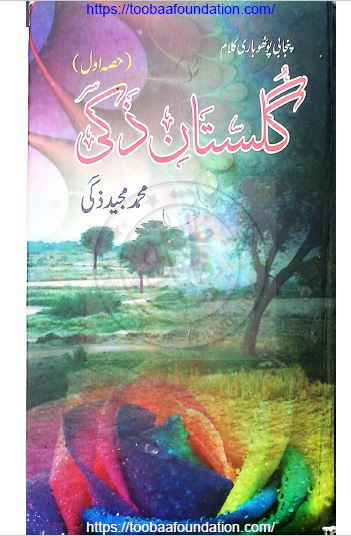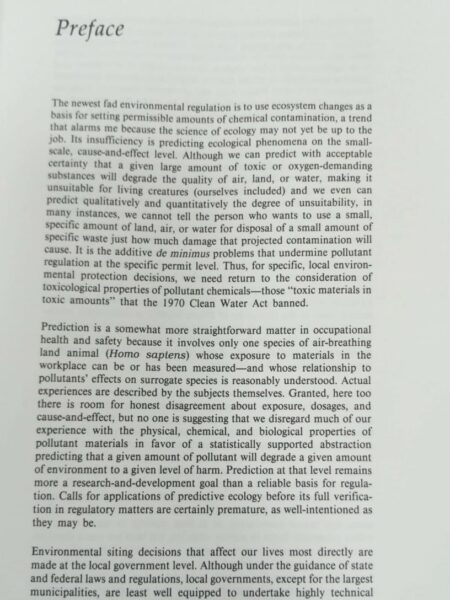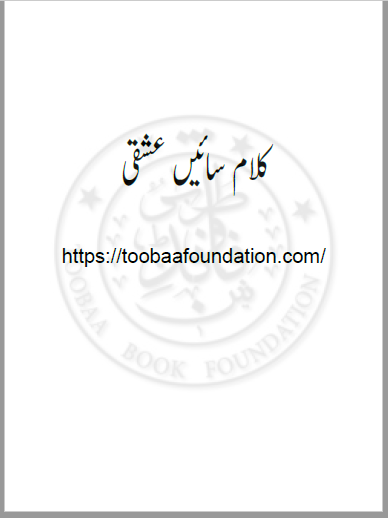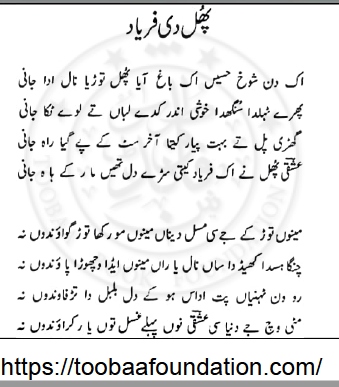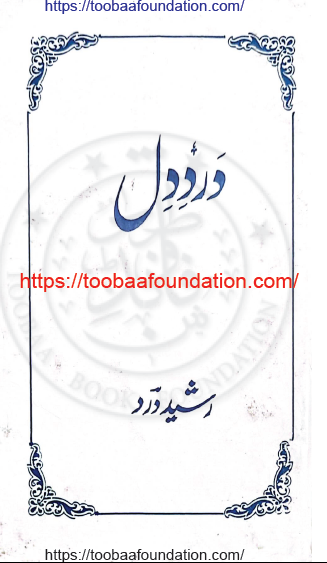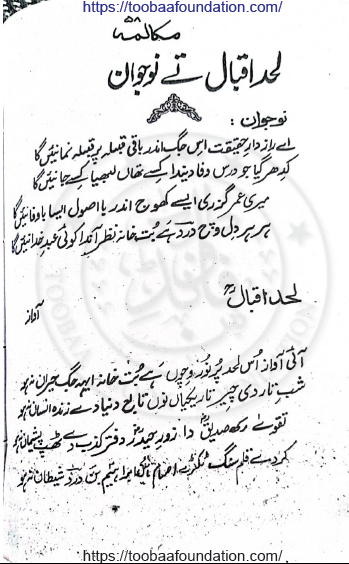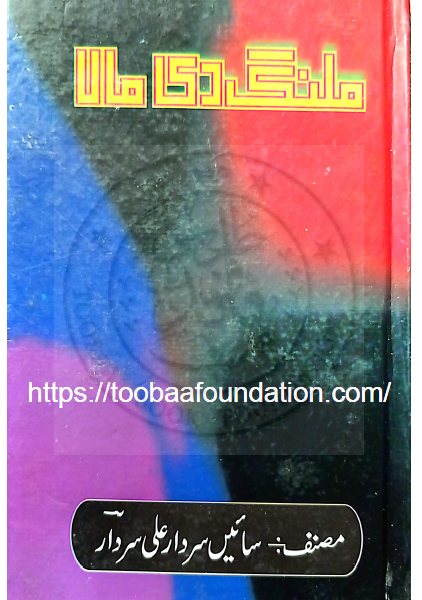- help@toobaafoundation.com
Close
-
-
Rated 5.00 out of 5(1)
Gulistan Zaki گلستان ذکی شاعر محمد مجید ذکی
Gulistan Zaki By Muhammad Majid Zaki Pothwari Poet(Pothwari Shaair)
گلستان ذکی شاعر محمد مجید ذکی پوٹھوہاری شاعر
-
-
Rated 5.00 out of 5(1)
Chiti Shahbaz Noon چھٹی شہباز نوں
-
Rated 5.00 out of 5(1)
ENVIRONMENTAL CONTAMINANT REFERENCE DATA BOOK VOLUME III BY JAN C. PRAGER
Crime and Everyday Life
Insights and Implications Society
Marcus FelsonThis book is currently available in the Municipal Library Pakistan, Rawalpindi Liaquat Bagh, you can download and view the index of the book.If you want the full PDF of this book, you can email us or WhatsApp us, you must inform us in the comments.
thank you -
-
Rated 2.00 out of 5(1)
Islam Kya Hai By Ameer Muhammad Akram Awan (RA) اسلام کیا ہے امیر محمد اکرم اعوانؒ
ٰIslam Kya Hai By Ameer Muhammad Akram Awan (RA)
اسلام کیا ہے امیر محمد اکرم اعوانؒ
-
(0)
Gallan Faqr Diyan Ishq Bhariyan/گلاں فقر دیاں عشق بھریاں
Introduction to the Book
Gallan Faqr Diyan Ishq Bhariyan (گلاں فقر دیاں عشق بھریاں)
The region of Pothohar has been home to many great Sufi poets, among whom Sufi Syed Akbar Aassi (صوفی سیداکبر عاصی) holds a distinguished place. Born in 1909 in the village Bhindar (بھنڈر), Islamabad, he was deeply rooted in spiritual and literary traditions. His Punjabi poetry collection, Gallan Faqr Diyan Ishq Bhariyan (گلاں فقر دیاں عشق بھریاں), is a testament to his deep devotion to Sufism, his love for the Prophet (PBUH), and his commitment to the path of divine truth.
Syed Akbar Aassi (سیداکبر عاصی) was not only a poet but also a devoted disciple of the Sufi path. His poetry blends themes of divine love, humility, and the search for ultimate truth. He beautifully expresses the struggles and joys of a seeker of truth, portraying both metaphorical and real aspects of spirituality. His words reflect his deep connection with Allah, the Prophet (PBUH), and the saints of Islam.
Life and Career
Belonging to the Rajput (راجپوت) family, Syed Akbar Aassi (سیداکبر عاصی) received his early education in his hometown. Alongside religious teachings, he completed his bAassic schooling up to the eighth grade. In 1932, he joined the Police Department (محکمہ پولیس) and served with honesty and dedication for 35 years, primarily in Delhi (دہلی) before retiring.
Even during his service, he remained deeply inclined towards Sufism. He frequently visited the shrines of saints and maintained a profound spiritual connection with the awliya (اولیاء). His devotion led him to a life centered on worship, contemplation, and poetry, which became a means to spread the message of divine love and unity.
Themes in His Poetry
The poetry of Syed Akbar Aassi (سیداکبر عاصی) revolves around several key themes:
- Divine Love (عشق حقیقی): His verses express a deep yearning for Allah and the Prophet (PBUH), emphAassizing unconditional love and devotion.
- Spiritual Poverty (فقر): Inspired by the teachings of great Sufi saints, he highlights the virtues of humility and detachment from materialism.
- Love for the Ahl al-Bayt (اہل بیت): His poetry showcases his immense respect and admiration for the family of the Prophet (PBUH).
- Guidance for Humanity: He provides spiritual wisdom on how to lead a meaningful and righteous life, free from the suffering of worldly attachments.
A Legacy Preserved
Despite living a simple life, Syed Akbar Aassi (سیداکبر عاصی) left behind a treasure trove of poetic wisdom. His profound words continue to inspire generations of readers and Sufi enthusiasts. His family, including Muhammad Shakeel Ahmad (محمد شکیل احمد), Muhammad Jameel Ahmad (محمد جمیل احمد), and Lateef Ahmad (لطیف احمد), took the noble initiative of compiling and publishing his poetry, ensuring that his message reaches a wider audience.
The book Gallan Faqr Diyan Ishq Bhariyan (گلاں فقر دیاں عشق بھریاں) serves as a guiding light for seekers of truth, encapsulating the essence of Sufism and divine love.
You can read this book at the following link:
🔗 Gallan Faqr Diyan Ishq Bhariyan -
(0)
Kalam Sain Ishqi/کلام سائیں عشقی
📖 Kalam Sain Ishqi (کلام سائیں عشقی)
✍️ Poet: Sain Ishqi (سائیں عشقی)Sain Ishqi (سائیں عشقی) was a renowned Punjabi Sufi poet whose poetry revolves around Tawheed, Risalat, Ishq-e-Haqiqi, and Tasawwuf. His work reflects deep spiritual truths, divine love, and the essence of mysticism.
🕌 Spiritual Background of Sain Ishqi
Sain Ishqi (سائیں عشقی) belonged to Baba Ilm Din Faqr (بابا علم دین فقر), Chak 81 Pandori J.B (چک 81 پنڈوڑی ج ب), Faisalabad (فیصل آباد). His poetry is filled with dervish wisdom and divine love, portraying the journey of the soul toward the ultimate truth.
🌿 Core Themes of Kalam
📌 Tawheed (توحید) – The oneness and power of Allah
📌 Risalat (رسالت) – The greatness and love of Prophet Muhammad ﷺ
📌 Tasawwuf (تصوف) – Spiritual path, divine wisdom, and mysticism
📌 Ishq-e-Haqiqi (عشقِ حقیقی) – Pure love for Allah and His Prophet ﷺ
📌 Dunya Ki Be-Sabaati (دنیا کی بے ثباتی) – The transient nature of worldly life📜 Selected Verses (Extracted from PDF)
🔹 Ishq Allah di Zaat Sain Ishqi (عشق اللہ دی ذات سائیں عشقی)
🔹 Muhabbatan De Rang Wich Range Jande Ne Aashiq (محبتاں دے رنگ وچ رنگے جاندے نیں عاشق)
🔹 Je Ishq Nahi Te Rab Nahi Labhna (جے عشق نئیں تے رب نئیں لبھنا)(More verses can be found in the book, reflecting deep Sufi wisdom and spiritual insights.)
📌Punjabi Poetry & Sufi Literature
📖 Punjabi Shayari (پنجابی شاعری), Sufi Shayari (صوفی شاعری), Ishq-e-Haqiqi (عشقِ حقیقی), Tawheed (توحید), Tasawwuf (تصوف), Allah Da Ishq (اللہ دا عشق), Wali Allah (ولی اللہ), Dervishi (درویشی), Wahdat-ul-Wujood (وحدت الوجود), Maarfat (معرفت), Punjabi Adab (پنجابی ادب), Lok Shayari (لوک شاعری), Auliya Karam (اولیاء کرام), Ruhani Shayari (روحانی شاعری), Allah Hoo (اللہ ہو), Punjabi Sachaiyan (پنجابی سچائیاں), Haqiqat Da Safar (حقیقت دا سفر), Baba Faqr (بابا فقر), Ishq-e-Ilahi (عشق الٰہی), Ruhani Kalam (روحانی کلام), Punjabi Sufi Riwayat (پنجابی صوفی روایات)
📥 Book Availability
This book is provided by Tooba Book Foundation (طوبیٰ بک فاؤنڈیشن) and can be downloaded for free.
-
(0)
Dard-e-Dil/درد دل
Dard-e-Dil
Book Title: Dard-e-Dil
Author: Qazi Abdul Rasheed Dard
Language: Punjabi (Pothohari)
Publisher: Dar-ul-Adab, Khawar Manzil, Hayat Sar Road, Gujar KhanAbout the Author
Qazi Abdul Rasheed Dard is a distinguished poet of Punjabi literature, especially Pothohari poetry. He belongs to a family with a rich scholarly and literary heritage, known for its contributions to knowledge, Naat recitation, and poetry across generations. His uncle, Qazi Abdul Wahid Sahib, was a renowned scholar and Naat reciter who made significant contributions to Punjabi and Pothohari literature.
Qazi Abdul Rasheed Dard is deeply inspired by Allama Iqbal’s poetry and philosophy. His work reflects Iqbal’s influence in themes of self-realization, divine love, spiritual awakening, and Islamic thought. His poetry embodies the fusion of classical and modern literary traditions, making it a valuable addition for readers interested in Punjabi books and literary collections.
Theme and Literary Significance of the Book
“Dard-e-Dil” is a poetic expression of the author’s thoughts, emotions, and intellectual perspectives. This book is a valuable contribution to Pothohari poetry and Punjabi literature, highlighting the author’s spiritual devotion, intellectual depth, and admiration for Iqbal’s philosophy. It includes poetry in various genres, such as Naat (praise of the Prophet), Hamd (praise of God), Manqabat (tributes to saints), Ghazal, and Nazm (poetic compositions), making it an essential read for those interested in Punjabi books online.
The poetry of Qazi Abdul Rasheed Dard is influenced not only by his mentor, Haji Mehrab Khawar Sahib, but also by Allama Iqbal. His work reflects Iqbal’s concept of selfhood (Khudi), depth of divine love, and spiritual values. If you are looking for Punjabi books free to download, this book is a must-read.
Key Features of the Book
✅ Poetry inspired by Allama Iqbal’s philosophy
✅ Themes of divine love, faith, and Sufism
✅ A beautiful blend of Naat, Hamd, Manqabat, Ghazal, and Nazm
✅ A remarkable example of Pothohari Punjabi poetry
✅ Simple yet profound poetry that touches the reader’s heart
✅ A unique fusion of modern and classical poetryConclusion
“Dard-e-Dil” is a unique literary masterpiece that combines Punjabi Naat poetry, Sufism, Iqbalian thought, and divine love. If you are interested in Punjabi poetry books or Pothohari literature, this book is a valuable addition to your collection. It is not only a treasured contribution to Pothohari poetry but also a source of spiritual enlightenment.
Download Free PDF
This book is available for free PDF download on the Tooba Book Foundation website. You can get it from the link below:
Prayers & Regards:
Mehrab Khawar
(M.A. Urdu, Persian, Punjabi)
Dar-ul-Adab, Khawar Manzil, Hayat Sar Road, Gujar KhanNow the text has been translated into English while keeping the essence intact. Let me know if you need any modifications! 😊📖
-
(0)
Malang Di Mala/ملنگ دی مالا
Sain Sardar Ali Sardar – Punjabi Sufi Poet
Sain Sardar Ali Sardar was a renowned Punjabi poet, belonging to the Bajwa family. He was born in 1922 in the village of Kakka Kolo, Wazirabad Tehsil, Gujranwala. His poetry is deeply rooted in Sufi thoughts, Malangi spirit, and spiritual themes. He holds a unique place in Punjabi literature and folk poetry.Sain Sardar Ali Sardar published four collections of poetry, reflecting his deep spiritual insight and devotion to the divine:- Zikr-e-Khair (ذکر خیر) – Punjabi Poetry
- Dhakhuda Dhuwan (دھخدا دھواں) – Poetry
- Malang Di Mala (ملنگ دی مالا) – Verses
- Malang Di Godri (ملنگ دی گودڑی) – Punjabi Kalam
His poetry remains immensely popular, especially among those who appreciate Sufi philosophy and Malangi themes. His words in Punjabi poetry continue to enlighten the hearts of seekers of divine love and truth. He is also known as the Kakka Kolo Poet and holds a significant place as a Wazirabad Punjabi Poet.


